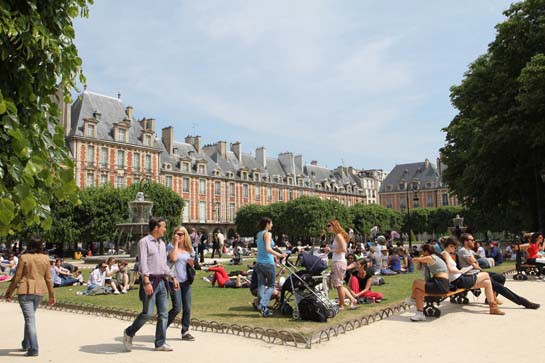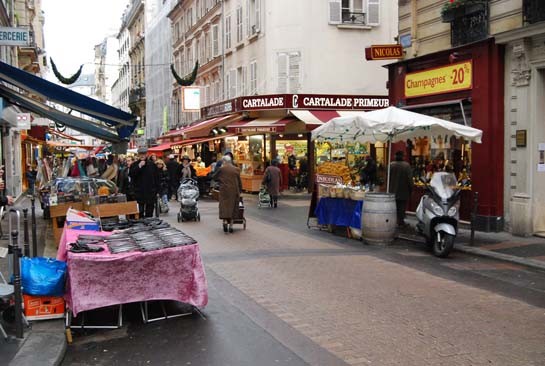Anglophone commentators contemplating Europe's sluggish economy, high unemployment, resurgent far-right parties, and the crying absence of strong European Union leadership, have found it easy to blame Europeans for their own misfortunes.
Many reserve their fiercest jeremiads for France. The Economist's November 17, 2012 cover, for example, warned that France was nothing less than "The time-bomb at the heart of Europe."
Most sing a familiar refrain: France's bloated public sector and extravagant social benefits, its reluctance to engage in structural reforms and fully embrace the market, all condemn it to an unsustainable future of lagging growth, high taxes, high debt and high unemployment.
There is more to this than disinterested analysis. For these critics, France functions as an economic morality tale about what not to do if you want your own country to be strong and prosperous. There but for the grace of our fiscally conservative ministers of finance go we.
WHEN WENTE WENT TO PARIS
Over the years, the Globe and Mail's columnist Margaret Wente has regularly joined her voice to this Greek chorus lamenting the tragedy of French socialism. She returned to this subject in a recent column describing a vacation in Paris, where she engaged in a bit of participant-observer ethnography to learn how real Parisians live.
What may come as a surprise to regular readers of Wente's free-market, anti-statist sermonizing is that she actually liked Paris. She was particularly impressed by the quality of life in France: the food is outstanding, state-run schools and day care excellent, public transit first rate, and leisure-time ample. Wente had to concede that, in France at least, a robust public sector offers substantial public goods. French taxpayers apparently get their money's worth.
Wente was therefore faced with a dilemma: how to reconcile her faith in small government, low taxes, and market forces with her firsthand impressions of life in social-democratic France? Why is life in what is supposed to be a socialist basketcase so darned nice?
SPINNING SPENDTHRIFT STORIES
In her effort to square experience with ideology, Wente offered a simple explanation: the French have it so good because they are spending beyond their means. It is only a matter of time before the whole happy edifice will come crashing down under the weight of public debt and an uncompetitive economy. France's current economic troubles are simply the price it is paying for clinging to a welfare state for too long.
The trouble with such explanations is that they simply don't stand up to the facts.
Let's start with labour. For Wente, the legally mandated 35-hour workweek is evidence that, "In France, quality of life is much more important than efficiency."
Such remarks misrepresent why the 35-hour workweek was introduced in 1998, and what it has achieved since. Conceived as a means to reduce unemployment by sharing job hours with more workers, the measure proved a success, stimulating the creation of over 350,000 new jobs within the first four years of its application.
The law also helped spark a substantial increase in worker productivity, in part because big businesses embraced the measure in exchange for an easing of workplace regulations, which allowed them to organize work and production regimes more efficiently.

An assembly line at the Airbus factory in Toulouse: French workers are the sixth most productive among OECD member countries. PHOTOGRAPH: JOSÉ GOULAO
French workers today are the sixth most productive among OECD member countries in terms of GDP per hour worked, more productive than the Germans or the Swiss. Canadians are 16th — for each hour Canadians work, they contribute 20 per cent less value to the economy than their French counterparts do.
Thanks to those productivity gains, wage costs for employers have actually decreased since the measure was introduced.
It seems then that in those rare moments between their long lunches and leisurely apéritifs, when the French actually work, they manage to be very efficient indeed.
Wente also takes a jab at that well-known French pastime, the labour strike. Admittedly, her vacation coincided with a prolonged railway-worker walkout. But let's not mistake one work-stoppage tree for the whole forest of French labour.
The union movement today is weak in France: only 7.8 per cent of workers are members of a labour union. In Canada, that figure stands at 26.8 per cent, according to OECD statistics for 2010.
In the decade between 1997 and 2006, France lost only 15 work days to strikes per thousand employees each year. Canada, which boasts one of the most combative labour movements in the industrialized world, lost 186 days, and has consistently bested France in this category for decades, according to the United Kingdom's Office of National Statistics. The idea that in France mighty unions shut the country down at will may have had a grain of truth in the 1950s and 1960s, but today, it is pure myth.
SOCIAL SPENDING STRENGTHENS WORKFORCE
Is social spending proving a costly drag on France's economy, as Wente would have it?
The affordable, high-quality day care that she marvels at isn't just a nice convenience for parents; it has played an important role in increasing women's rates of participation in the workforce. According to the OECD, 83.8 per cent of French women 25-54 years of age worked in 2010, compared to 82.3 per cent in Canada, and only 75.2 per cent in the U.S.
The day care system has succeeded in keeping large numbers of women at work at a time when France enjoys one of the highest birthrates in the industrialized world: in 2012, according to the World Bank, France's fertility rate was two, Canada's 1.6.
Publicly funded day care is not just an investment in gender equity, family and kids, but in economic growth. Studies of Québec's low-cost day cares demonstrate that working women's contributions to GDP, and the corresponding boost to provincial tax revenue, more than pay for the program.
Or take Paris's public transit. Despite the fact that the City of Light's transportation authority, the Régie Autonome des Transports Parisiens (RATP), receives no public funds in support of its operations, it made 284 million euros in net profit in 2013 running a system that moves nearly twice as many people per year as Montréal, Toronto, and Vancouver's transit systems combined.
Compare that to the Toronto Transit Commission, which needed $CAN 480 million of city funds in 2012 alone to keep its networks running, despite operating a smaller network and charging higher fares than the RATP: proof that state-owned enterprises like the RATP can be efficiently run and contribute appreciably to the public good.

Odéon Station, part of the well-funded Paris Métro. PHOTOGRAPH: CRAMOS
Granted, the RATP relies on government subsidies for capital investment — the construction of new transit, or capital improvements to the existing network — to the tune of 2 billion euros per year.
Before we throw up our hands at this profligate, taxpayer-financed gold-plating, we would do well to dwell on a 2013 Toronto Board of Trade report. After calculating that inadequate transportation infrastructure cost the city's economy $CAN 6 billion per year in lost productivity, the report called on both city and provincial governments to raise taxes to support expanding public transit. A little public investment can go a long way towards generating economic growth.
If critics like Wente are to be believed, it's all too good to last. France's oversized public sector weighs down the economy with a crippling tax burden, and its rigid labour market makes it impossible for its businesses to compete.
If this were true, the signs of socialist decline should have been evident by now. France is unquestionably a high-tax society. According to the OECD, total tax revenue represented 45 per cent of GDP in France in 2012, as compared to 37.6 per cent in Germany, and 30.7 per cent in Canada.
Yet in the period between 1997 and 2013, France's economy grew on average 1.5 per cent per year — faster than the economy of the Euro zone as a whole, and faster even than that of Germany, Europe's current poster boy for structural reform.
TAXING WISELY, TAXING FAIRLY
Nor do France's Socialists seem to dampen growth much. Between 1997 and 2001, when the left were last in power — and the allegedly prosperity-killing 35-hour workweek came into effect — growth averaged 2.9 per cent, again above the Euro-zone average and well above Germany's two per cent.
French growth stalled at 0.1 per cent during the 2008-2013 Great Recession — but that was still higher than the EU average, and much higher than in the United Kingdom, where the economy actually contracted by 0.2 per cent.
If it's done right, heavily taxing an economy does not need to translate into slower growth. That Sweden taxed even more of its GDP than France didn't stop it from enjoying faster growth than either Canada or Germany did between 2009 and 2012.
Perhaps France has been paying the price via its high unemployment rate? While France's jobless numbers have been higher than anyone would like to see, they are actually a little better than the EU average over the 1997-2013 period, including during the Great Recession. Despite its higher labour costs and stronger employment protections, France created substantially more jobs than the United Kingdom between 1994 and 2004, including twice as many in the private sector.
When we consider the employment rate, defined as the percentage of people within a given population who are employed, rather than the unemployment rate, which measures the percentage of people in the total workforce seeking work, the notion that France is home to an unusually large jobless population evaporates.
Every year since 2002, a substantially higher percentage of French people between the ages of 25 and 54 have been employed than Americans of the same age bracket — and that gap has actually widened sharply since the start of the Great Recession.

Leisure time at the Place des Vosges in Paris: a benefit of the 35-hour workweek? PHOTOGRAPH: CRAIG M. JOHNSTON
In the first quarter of 2013, 81 per cent of French adults in this age group were employed, while only 76 per cent of Americans were. Lest Canadians think they have a thing or two to teach the French, the two country's employment rates have tracked each other closely since the early 2000s; for the first quarter of 2013, Canada's stood at 82 per cent. And the French rate has actually held higher than Canada's during most of the period since 2007.
Has France managed to sustain its lifestyle on the back of massive public borrowing? Once again, a look at the numbers suggests otherwise. According to the World Bank, in 2001 — the final full year of the last Socialist-led government — France ran a deficit of 1.7 per cent GDP, in line with Canada's 1.6 per cent under Paul Martin's prudent financial stewardship. France's total central government debt stood at a sensible 48.3 per cent of GDP, according to OECD numbers.
During the Great Recession, France always ran much lower deficits as a proportion of GDP than either the United States or the United Kingdom did. In 2013, France's total debt stood at 93.5 per cent, higher than Germany's (78.4 per cent), but roughly the same as the UK's or the Euro zone's average, Eurostat figures tell us.
A FINE FRENCH LIFE
Perhaps France's uncompetitive economy has made daily life simply unaffordable for the French, as Wente posits? Judging, as she does, France's cost of living on the basis of a holiday rental in Montorgueil, one of Paris's hottest neighborhoods for hip young professionals, is like shopping for real estate in Toronto's Forest Hill and declaring Canada to have priced out everyone except the rich. The OECD's data on comparative price levels are categorical: Canada and France enjoy roughly the same cost of living.
But Wente inadvertently raises a good point. Let's rephrase the question, and ask expensive for whom?
For a high-income household in the top marginal tax bracket of 49 per cent for income over 500,000 euros, fiscal life in France is expensive. The rate is high, to be sure, but it isn't so far off from the top cumulative federal-Ontario rate of 46 per cent. And for those paying France's infamous wealth tax, life is costly indeed: assets over 1.3 million euros are taxed at progressive rates that run between 0.5 and 1.5 per cent.
But for a working single mom, the combination of family subsidies, affordable child care, and perhaps even a low-rent apartment in public housing (nearly half the rental market in France), makes life substantially less expensive than it is for her counterpart in Canada. France spends 4 per cent of GDP on families, one of the highest rates in the world; Canada spends only 1.5 per cent.
For a university student of modest means, low tuition fees mean that it is rare indeed for French students to resort to borrowing to finance their studies; young Canadians today leave university carrying on average $25,000 of debt on their back.
For the elderly, generous publicly funded pay-as-you-go pensions — which don't risk tanking when the stock market heads south, unlike the bulk of Canadian pensions — guarantee French retirees among the highest relative incomes in the world, as measured by the OECD. These pensions also keep old-age poverty rates down (lower than those in Germany and in the UK, and far lower than those in the U.S.).

Old and young shop on Rue de Levis, a pedestrian street in Paris. PHOTOGRAPH: CHRISTOPHE ZIMMERLIN
The gap separating rich from poor has not widened in France in recent years in the way that it has in most industrialized countries, including Canada, Germany, and the United States. In Canada, 12 per cent of the population in 2005 earned less than half of the median annual income (the OECD's definition of poverty line). In France, only 7 per cent fell below the OECD poverty line.
Not only are there proportionally more poor people living in Canada than in France — people for whom the cost of living is very expensive indeed — France's more generous wealth transfers and public services also pull proportionally more of its poor out of poverty than Canada's do. Whatever one thinks about wealth redistribution as a principle, it is in practice an effective tool for reducing poverty.
Suspicious even of the things she likes best about France, Wente assumes they must derive from some nefarious, debt-fueled source. Why is France's food so good? "Heavily subsidized small farmers," she writes.
All pleasures are apparently guilty.
The EU does subsidize agriculture at somewhat higher levels than Canada and the United States do. Up until 2013, however, Europe's Common Agricultural Policy favoured large livestock, cereal, oil-seed, and protein-crop farmers. You can be certain that the farmer who produced the pint of delicious strawberries that Wente savoured in Paris didn't receive any cheques from Brussels for his pains. Fruits and vegetables are excluded from the EU direct payment program.
France has preserved an unparalleled network of small farmers growing varied and high-quality food in spite of EU subsidies, and it is precisely these farmers who have been among the loudest voices criticizing a farm support system that favours large producers of cash crops. Let's get our syllogisms right: the public sector does much good in France, but all that is good in France is not necessarily supported by the public sector

Harvesting a wheat field near Jebsheim, Alsace. PHOTOGRAPH: CHRISTOPHE ZIMMERLIN
To be sure, France faces many serious problems today, like:
- its narrowly recruited, out-of-touch political class
- increasing racial tensions
- underinvestment in basic research
- an educational system that no longer serves the disadvantaged effectively
- a core of long-term unemployed
- a broken industrial policy
- political institutions tarnished by corruption scandals
But high taxes, government borrowing, short workweeks, paid vacations, and generous social programs are not among them.
So if its growth, unemployment, deficit and debt levels aren't at levels all that different from the rest of the industrialized world, why are North American columnists all so worked up about France?
As the G7 country with the highest tax revenue as a proportion of GDP, and the home of the only political left which has never entirely made its peace with the market, France represents a powerful challenge to the notion that small government and deregulated markets are the only viable path forward.
INVENTION WITH INTENTION
The France held up by neoliberal commentators and right-wing pundits like Wente is thus a pure invention, one intended to convince us that big government, high taxes, strong employment protections, and generous social programs stifle economic growth and hurt our interests. It is a testament to their success that such notions are today so widely accepted as common sense.
Those who pummel this French straw man do so in order to make the case that government spending is always too high and postwar social contracts unsustainable. That central bankers, Brussels technocrats, and columnists like Margaret Wente can pass monetarist mantras off as self-evident truths, however contested their merits are among economists, has had a real impact on policymaking on both sides of the Atlantic, needlessly prolonging recessions.
The EU's insistence that member countries maintain budget deficits below three per cent of GDP, even in periods of slow growth and high unemployment like the one Europeans are currently enduring, has condemned these countries to prolonged austerity. Moreover, it has deprived their economies of the much-needed stimulus that Keynesian deficit spending can provide during economic downturns.
THE AGENDA BEHIND AUSTERITY
Austerity policies ostensibly aimed at putting public finances back on sound footing often conceal more radical projects to dismantle welfare states. UK prime minister David Cameron admitted as much last November, when he declared that his spending cuts were not in fact an emergency response to the crisis at all, but were instead aimed at "something more profound. It means building a leaner, more efficient state . . . permanently."
A measured consideration of France, rid of neoliberal caricature, offers evidence that Margaret Thatcher was wrong when she famously declared "there is no alternative."
France doesn't necessarily have all the answers, but its social model reminds us that we should at least be asking the right questions:
- Why should gains in labour productivity go to reward capital, and not workers in the form of reduced workweeks, longer vacations, or lower retirement ages?
- Why must social spending be slashed to close deficits that were opened by paying for bank bailouts and tax cuts which disproportionally benefit wealthy people?
- Is rising social inequality really inevitable?
- Isn't public investment in infrastructure a productive investment in societies' futures?
When Wente wistfully declares that the French model, however rosy, is "not the future, it's the past," she is telling us that historical necessity has condemned us all to work long hours, eat tasteless industrial food, struggle to meet our child care needs, and suffer miserable infrastructure. This is a sad future indeed.
It is up to us to remember that the public good is worth public investment and that better, happier futures are both possible and worth fighting for.
Paul Cohen is currently Director of the Centre for the Study of France and the Francophone World and associate professor in French history at the University of Toronto. He has published widely on issues of scholarly and contemporary concern, in Canada, the United States, and France, including recent contributions to Dissent and Spacing Magazine.
His writing has been picked up by the Chronicle of Higher Education's Arts & Letters Daily portal and by the New Yorker's "Page-Turner" blog.












